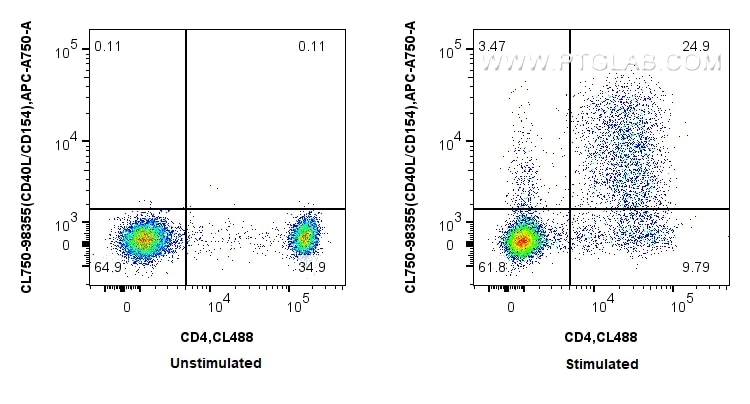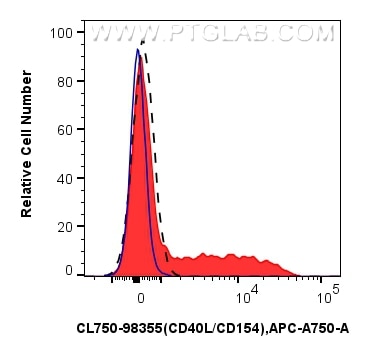Tested Applications
| Positive FC detected in | PMA and ionomycin treated human PBMCs |
Recommended dilution
| Application | Dilution |
|---|---|
| This reagent has been pre-titrated and tested for flow cytometric analysis. The suggested use of this reagent is 5 ul per 10^6 cells in a 100 µl suspension or 5 ul per 100 µl of whole blood. | |
| Sample-dependent, Check data in validation data gallery. | |
Product Information
CL750-98355-2 targets CD40L/CD154 in FC applications and shows reactivity with human samples.
| Tested Reactivity | human |
| Host / Isotype | Rabbit / IgG |
| Class | Recombinant |
| Type | Antibody |
| Immunogen | CD40L/CD154 fusion protein Eg3501 Predict reactive species |
| Full Name | CD40 ligand |
| Calculated Molecular Weight | 261 aa, 29 kDa |
| GenBank Accession Number | BC071754 |
| Gene Symbol | CD40 Ligand |
| Gene ID (NCBI) | 959 |
| Conjugate | CoraLite® Plus 750 Fluorescent Dye |
| Excitation/Emission Maxima Wavelengths | 755 nm / 780 nm |
| Form | Liquid |
| Purification Method | Protein A purification |
| UNIPROT ID | P29965 |
| Storage Buffer | PBS with 0.09% sodium azide and 0.5% BSA, pH 7.3. |
| Storage Conditions | Store at 2-8°C. Avoid exposure to light. Stable for one year after shipment. |
Background Information
The CD40 ligand (CD40L, TRAP, CD154), a member of the TNF superfamily of ligands, is expressed as either a 33 kDa transmembrane homologue or 18 kDa soluble form (sCD154). CD40L is primarily expressed on activated CD4+ T cells and on a small proportion of CD8+ T cells and platelets. It binds to CD40 on antigen-presenting cells (APC), which leads to many effects depending on the target cell type. Recent studies have suggested that CD40/CD40L interactions regulate oxidative stress and affect various signaling pathways in both the immunological and the cardiovascular systems. The CD40/CD40L system is also involved in tumorigenesis.
Protocols
| Product Specific Protocols | |
|---|---|
| FC protocol for CL Plus 750 CD40L/CD154 antibody CL750-98355-2 | Download protocol |
| Standard Protocols | |
|---|---|
| Click here to view our Standard Protocols |





